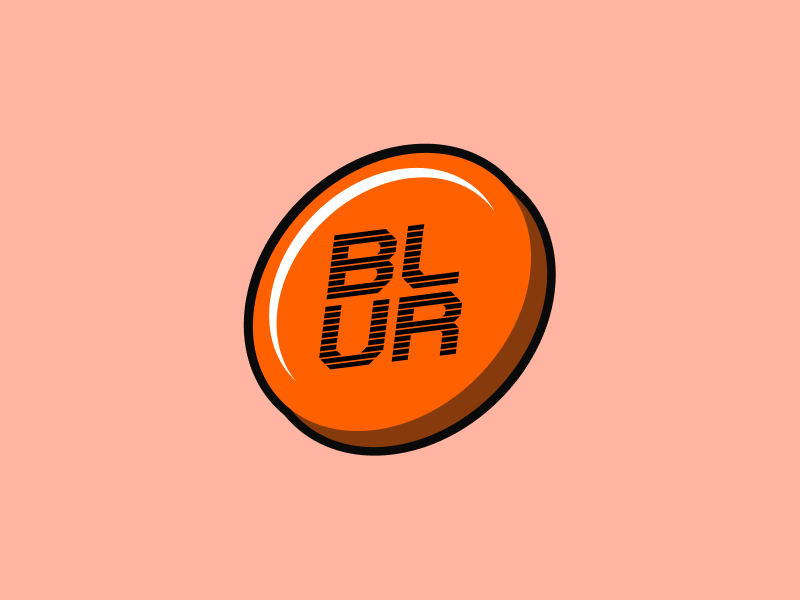Exploring the BRC-20 Ecosystem: Tokens, Wallets, and Innovative Projects
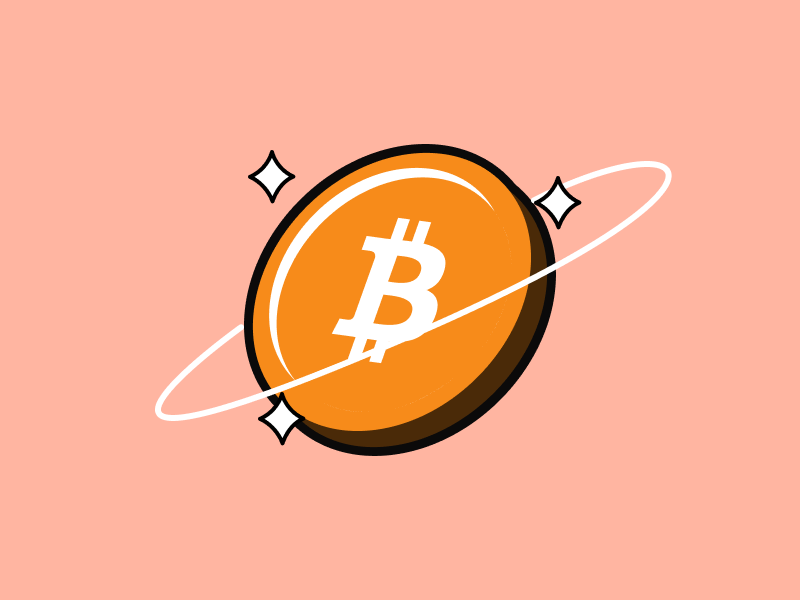
The introduction of BRC-20 within the Ordinals protocol transforms Bitcoin from just a cryptocurrency into a platform supporting diverse decentralized assets and applications. Introduced in March 2023, BRC-20 has grown to encompass a broad ecosystem spanning NFTs, wallets, DEXs, bridges, launchpads, and various other sectors. This article will delve deeper into the BRC-20 ecosystem by showcasing blockchain projects that align with this standard.
Article Summary
- 🪙 BRC-20 is an experimental token standard designed specifically for implementation on the Bitcoin blockchain.
- 🔬 Despite being in the experimental stage, BRC-20 has garnered significant interest within the Bitcoin community, with developers actively producing BRC-20 tokens and dApps on the Bitcoin network.
- 📝 In contrast to ERC-20, a standard token exchangeable on Ethereum through smart contracts, BRC-20 employs Ordinals inscription on Bitcoin to establish a semi-fungible token.
- ✨ Projects in the BRC-20 ecosystem include ORDI, MUBI, UniSat Wallet, Tonka Finance (TOKA), and Magic Eden.
Overview of BRC-20
BRC-20 is an experimental standard token designed specifically for implementation on the Bitcoin blockchain. It was introduced in early March 2023 by Domo, a blockchain analyst, based on the Ordinals protocol.
The BRC-20 standard supports the creation and transfer of fungible tokens through the Ordinals protocol. Examples of popular tokens in BRC-20 are ORDI, SATS, MUBI, etc.
Unlike ERC-20, a standard for fungible tokens on Ethereum using smart contracts, BRC-20 uses ordinal inscriptions on Bitcoin to create semi-fungible tokens. This method is considered easier due to the limited programming capabilities of the Bitcoin blockchain.
In other words, BRC-20 tokens are tokens where the token data is stored in calldata (in JSON format) rather than in smart contracts.
Bitcoin's Ordinals introduced the concept of inscription. Ordinals allow data to be inscribed or embedded directly on the chain. This data can be text, images, videos, etc. It is the only way for BTC to add support for NFTs and other tokens, as BTC does not support smart contracts.
Also read: What Are Ordinals? Bitcoin NFT Innovation.
BRC-20 Performances
BRC-20 has garnered significant interest in the Bitcoin community despite being an experiment. Other developers are now creating their own BRC-20 tokens, and infrastructure providers, including wallet services and marketplaces, have integrated BRC-20 to enable users to mint and trade tokens.

The increase in BRC-20 transactions and NFT Ordinals led to increased pressure on the Bitcoin network speed, which can only process 7 TPS. On May 8, 2023, more than 300,000 transactions were delayed as transaction fees reached a 2-year high of over 30 US dollars.
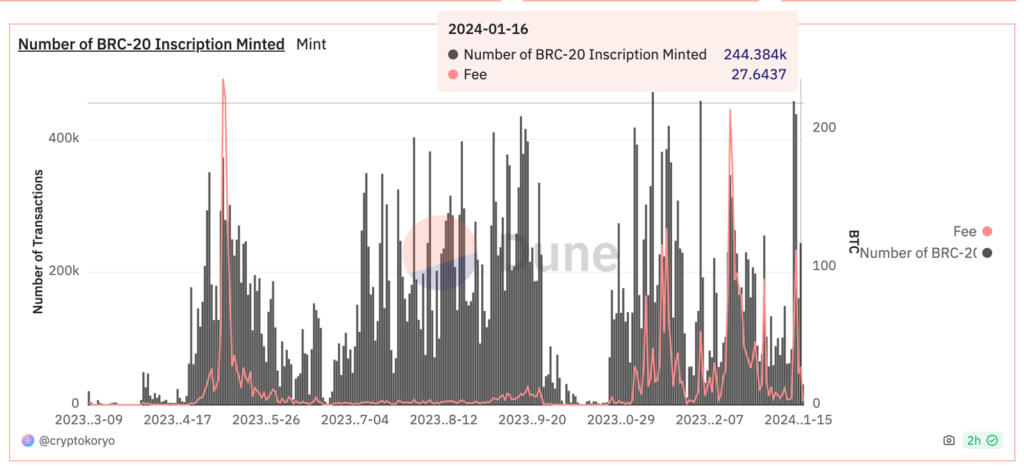
As of January 16, 2024, 244,384k BRC-20 tokens have been created, surpassing 250,000 transactions, and transaction fees exceed 30 BTC.
Most transactions on the Bitcoin blockchain are currently dominated by Ordinals (BRC20). Since BTC Ordinals are the pioneers, all eyes will be on this ecosystem, and it has the potential to grow over time.
Also read: What are Ethscriptions? Ordinal-inspired Innovation on Ethereum.
BRC-20 Ecosystem
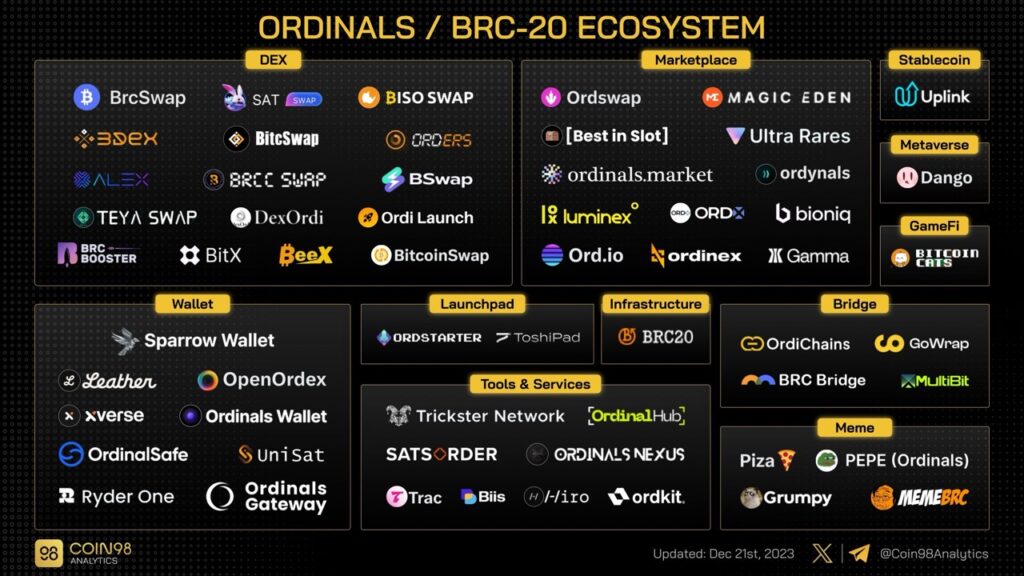
Although relatively new in the cryptocurrency space, BRC-20 has quickly established a strong ecosystem. Certain developers actively create dApps tailored for BRC-20, while others ensure their systems align with the BRC-20 standards.
Here are some blockchain projects that are in the BRC-20 ecosystem:
1. ORDI
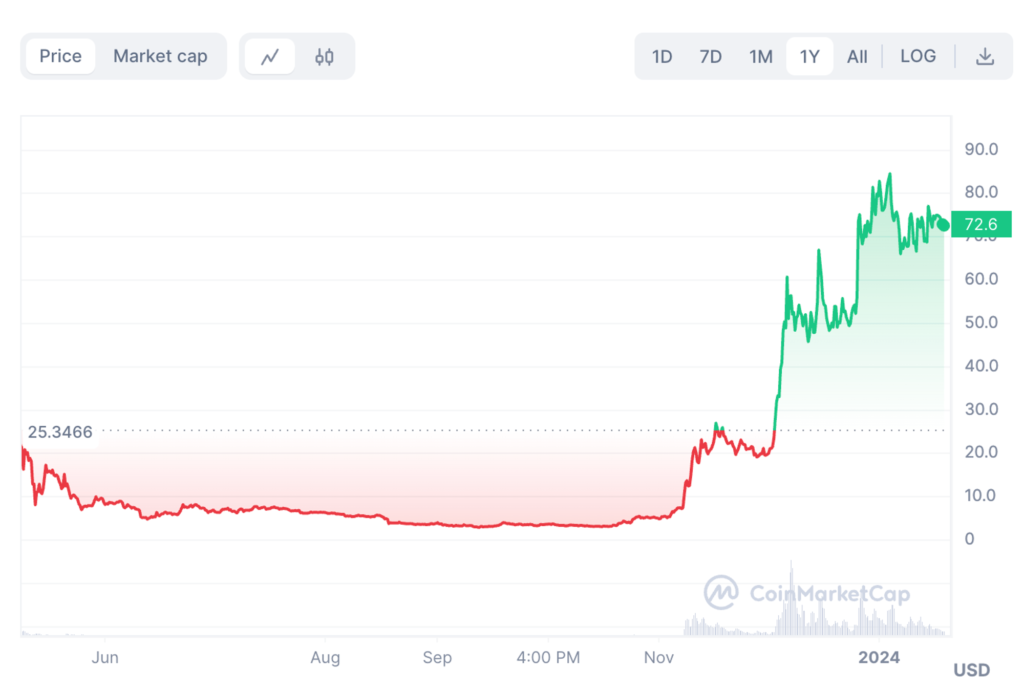
ORDI is the first BRC-20 token created in the Ordinals protocol on the Bitcoin network. It has the same maximum supply as BTC at 21 million ORDI tokens.
ORDI witnessed a surge in popularity as the Bitcoin community engaged in direct token and NFT creation and trading on the Bitcoin network. In May 2023, a major CEX initiated the listing of ORDI, enhancing its accessibility and liquidity. Consequently, the price of ORDI soared by over 1000%, driven by investor interest in possessing one of the first BRC-20 tokens.
Currently, ORDI is traded at 72 US dollars with a daily trading volume of over 180 million US dollars. By market cap amount, the ORDI token is in the 51st position as the largest BRC-20 token, followed by SATS, MUBI, and OXBT.
Learn more about what ORDI is in this article.
2. MultiBit Bridge (MUBI)

MultiBit is one of the first bridging token dApps in the BRC-20 ecosystem. With MultiBit, users can easily transfer BRC-20 tokens to other networks. As of November 2023, more than 500k US dollars are already bridged between Bitcoin and EVM networks.
MultiBit currently supports Ethereum, BNB Smart Chain, Solana, and Polygon networks.
In addition to token bridging, MultiBit also has some excellent features like staking, NFT bridge, farming, and swapping.
3. UniSat Wallet
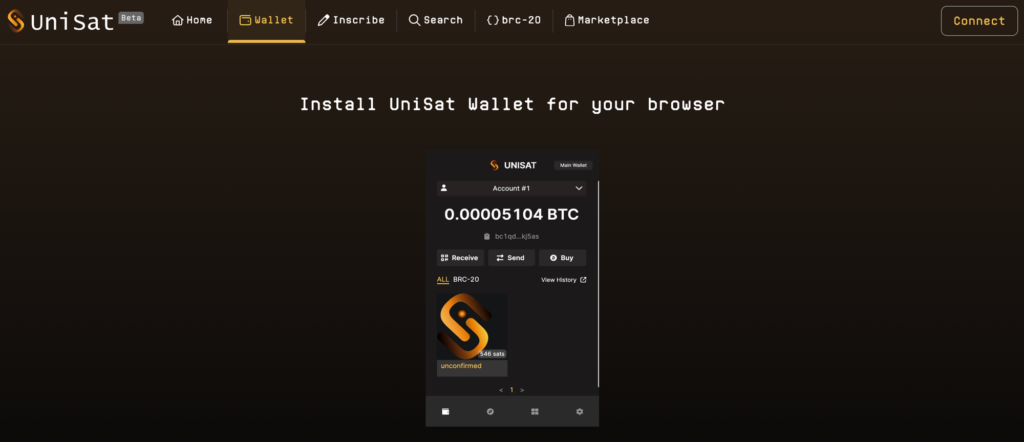
UniSat is a browser extension wallet that stores and transfers NFT Ordinals and BRC-20 tokens. While several wallets support NFT Ordinals, many of them have significant limitations. For example, the official wallet (Ordinals.com) requires users to run a full node, which can be a considerable task. Meanwhile, the ordinal wallet (Ordinals Wallet) supports NFT storage but does not support transfer functions.
UniSat Wallet enables users to effortlessly receive, store, and send NFTs in a manner akin to regular Bitcoin transactions. Using UniSat Wallet greatly enhances the user experience in accessing the Bitcoin network.
Moreover, UniSat Wallet lets users observe unconfirmed NFTs directly by showcasing the latest NFTs in the mempool. Users can replace outdated NFTs by paying supplementary fees to rectify any errors as necessary.
4. BitStable
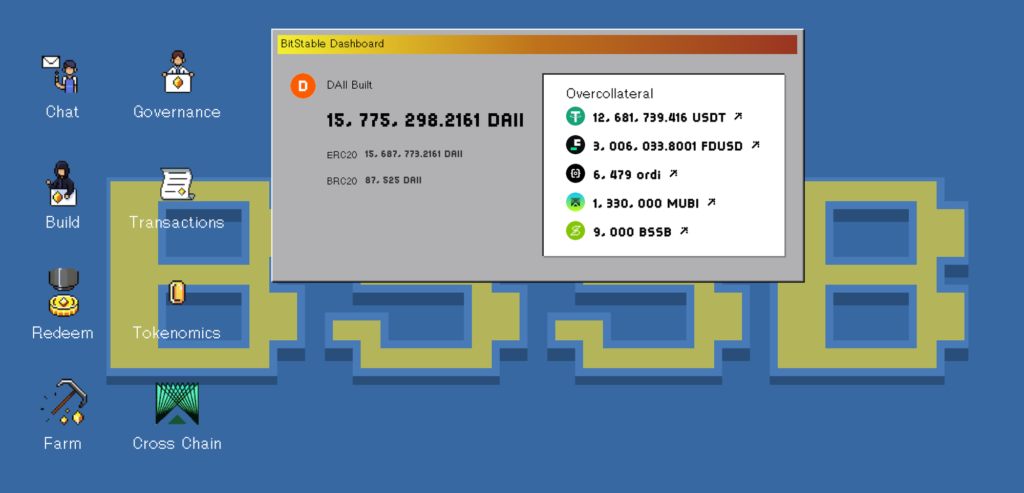
BitStable is a platform for generating the DAII stablecoin by utilizing collateralized assets within the Bitcoin ecosystem. This protocol is very innovative, introducing a unique framework for creating, trading, and overseeing synthetic assets on the Bitcoin blockchain.
DAII facilitates cross-chain connectivity and is comparable to USDT, USDC, and DAI, with a 1:1 value pegged to the US dollar. This feature ensures advantages for Bitcoin users and integrates the Ethereum community, fostering a more interconnected and seamless blockchain ecosystem.
In the initial phase, BitStable’s development team focused on ORDI as collateral for creating DAII.
BitStable has its governance token, BSSB. Holding BSSB is not only about governance but also involving yourself in the growth of BitStable. You can earn BSSB in two ways: DAII and BSSB staking on the Farm page.
5. Magic Eden
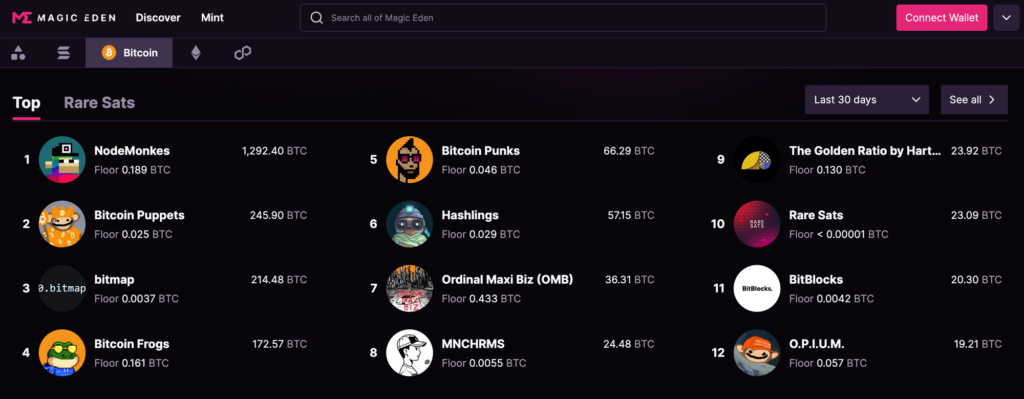
In June 2023, Magic Eden, one of the popular NFT marketplaces on Solana, announced the integration of BRC-20 token capabilities into its system. This announcement came two months after it introduced a Launchpad for Bitcoin Ordinals. The enhancement empowers Magic Eden creators to unveil their BRC-20 NFTs for direct minting on the platform.
Quoted from NFT Now, Zhuoxun Yin, Co-Founder, and COO of Magic Eden, said that by integrating BRC-20 into the Magic Eden platform, his platform could simplify the user experience and make Magic Eden the most comprehensive NFT platform for the Bitcoin ecosystem.
Conclusion
BRC-20 is an experimental token standard for the Bitcoin blockchain, introduced in March 2023 by blockchain developer Domo. Despite its experimental nature, BRC-20 has attracted the Bitcoin community to continue developing its ecosystem.
Projects in the BRC-20 ecosystem include ORDI, MUBI, UniSat Wallet, BitStable, Magic Eden, and others. ORDI, the first BRC-20 token, garnered significant popularity, contributing to the broader introduction of BRC-20 within the community.
Despite its unique advantages, the BRC-20 token also has limitations regarding smart contract functionality and interoperability. Therefore, the Bitcoin community continues to innovate while expanding its ecosystem.
Buy BRC-20 Token on Pintu
After knowing the BRC-20 ecosystem, you can start investing by buying BRC-20 tokens such as ORDI, SATS, and others without worrying about fraud on Pintu. Pintu diligently evaluates all its crypto assets, highlighting the significance of being cautious.
Pintu is also compatible with popular wallets such as Metamask to facilitate your transactions. Download the Pintu app on the Play Store and App Store! Your security is guaranteed because Pintu is regulated and supervised by Bappebti and Kominfo.
Aside from buying and trading crypto assets, you can expand your knowledge about cryptocurrencies through various Pintu Academy articles. All Pintu Academy articles are updated weekly for knowledge and educational purposes, not as financial advice.
References
- Chainlink Team, What Is a BRC-20 Token? Chainlink, accessed 16 January 2024.
- Alex Wacy, BRC-20 Ecosystem, X, accessed 16 January 2024.
- John Isige, What is BRC-20? Techopedia, accessed 16 January 2024.
- Unicorn Ultra, What is BRC-20? How BRC-20 Tokens Are Revolutionizing The Bitcoin Blockchain, Medium, accessed 16 January 2024.
- Elizabeth Gail, What is a BRC-20 token standard: An Overview, Cointelegraph, accessed 17 January 2024.
Share


